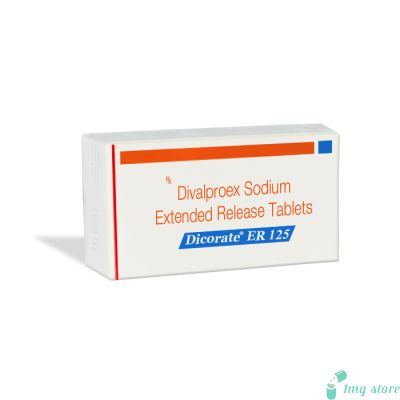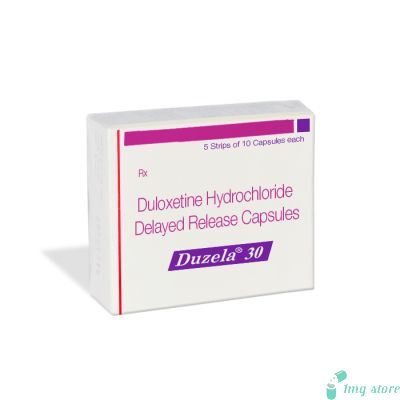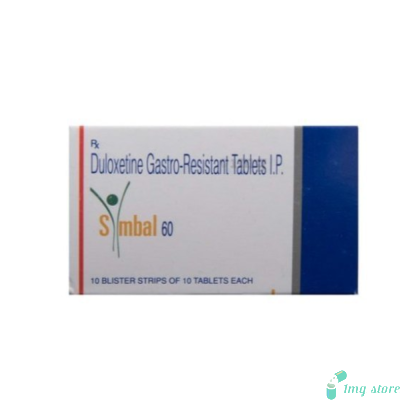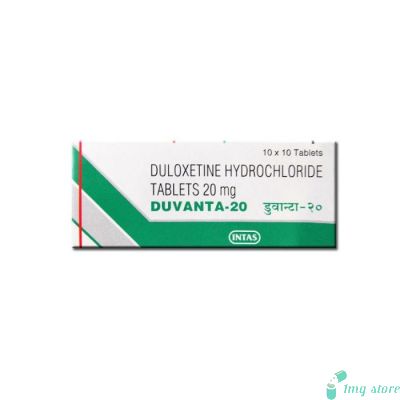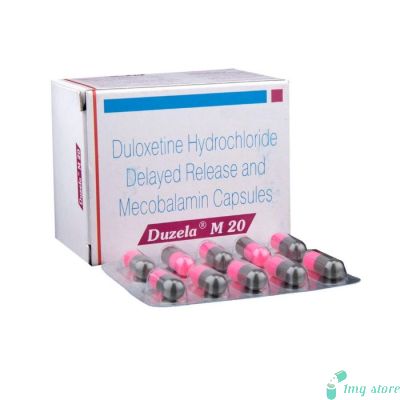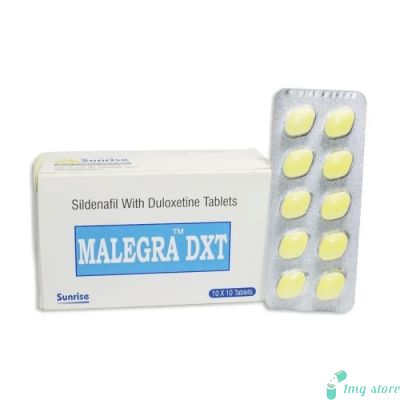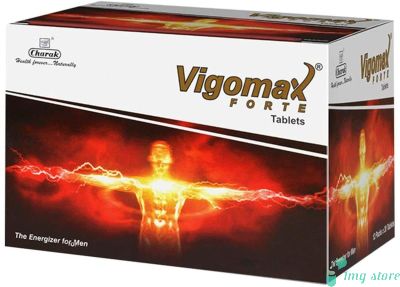DLX Tablet (Duloxetine)
Duloxetine Tablet is utilized in the treatment of sadness, anxiety disorder, diabetic nerve torment, fibromyalgia (a condition wherein there is summed up torment and delicacy in the body), neuropathic torment, and stress urinary incontinence.
DLX Tablet (Duloxetine): Effective for Depression and Anxiety
DLX Tablet (Duloxetine) is a medication primarily prescribed for the treatment of major depressive disorder (MDD) and generalized anxiety disorder (GAD). It belongs to a class of drugs known as selective serotonin and norepinephrine reuptake inhibitors (SNRIs). Duloxetine works by increasing the levels of serotonin and norepinephrine, two neurotransmitters in the brain, which help regulate mood and alleviate symptoms of depression and anxiety. It is also sold under the brand name Cymbalta.
DLX Tablet is available in various strengths, typically ranging from 20 mg to 60 mg. The exact dosage prescribed by a healthcare professional may vary depending on the individual's condition and response to the medication. It is usually taken orally, with or without food, once or twice daily. Another form, Duloxetine Extended-Release Tablets, commonly known as Duloxetine ER, is a form of medication that contains the active ingredient duloxetine. The extended-release formulation allows for sustained release of the medication over a longer period of time.
In addition to its approved uses for depression and anxiety disorders, Duloxetine may also be prescribed for the management of diabetic peripheral neuropathy, fibromyalgia, chronic musculoskeletal pain, and certain types of chronic pain. DLX Tablet is a prescription-only medication, meaning it can only be obtained with a valid prescription from a licensed healthcare professional. It is crucial to follow the prescribed dosage and duration of treatment as directed by your doctor and to discuss any concerns or questions you may have regarding the medication. The doses should be taken as per instructed by your physician or healthcare provider. If you miss the dose then take it as soon as you remember, however, if it is time for the net dose then skip the missed dose and continue with your prescription. It should be swallowed whole and not crushed, chewed, or broken. If a patient is unable to swallow it, it can be dissolved in water or apple juice.
Duloxetine Tablets offer several potential benefits for individuals who are prescribed this medication.
Duloxetine for Depression: DLX Tablet is primarily used to treat major depressive disorder (MDD). It helps improve mood, reduce feelings of sadness or hopelessness, and restore a sense of well-being. By increasing the levels of serotonin and norepinephrine in the brain, DLX Tablet can help alleviate depressive symptoms.
Management of Anxiety Disorders: DLX Tablet is also effective in treating generalized anxiety disorder (GAD). It helps reduce excessive worry, nervousness, and tension associated with this condition. By modulating the levels of neurotransmitters, DLX Tablet can promote a calmer state of mind.
Relief from Chronic Pain: As Neurology Drug, Duloxetine Tablets are sometimes prescribed for the management of chronic pain conditions. It can be beneficial for individuals with diabetic peripheral neuropathy, fibromyalgia, and certain types of chronic musculoskeletal pain. DLX Tablet helps to decrease pain signals in the brain, providing relief and improving overall quality of life.
Treatment of Other Disorders: In addition to depression, Anxiety, and chronic pain, DLX Tablet may be used to treat other conditions such as urinary incontinence and certain types of stress urinary incontinence. It can help control bladder function and reduce related symptoms.
Improved Functioning and Quality of Life: By addressing the symptoms of depression, anxiety, and chronic pain, DLX Tablet can help individuals regain their normal functioning and improve their overall quality of life. It can enhance motivation, increase energy levels, and improve concentration and focus.
It is important to note that the specific benefits and effectiveness of DLX tablets may vary from person to person. The decision to use DLX Tablet should be made in consultation with a healthcare professional, who can assess your individual condition and determine if it is an appropriate treatment option for you.
While taking Duloxetine (DLX Tablet), remembering the accompanying safeguards is significant:
Inform Your Healthcare Provider: Before starting Duloxetine, inform your healthcare provider about any medical conditions you have, such as liver or kidney disease, epilepsy or seizures, glaucoma, bipolar disorder, or a history of bleeding disorders. Also, disclose any medications, supplements, or herbal products you are currently taking, as some drugs may interact with Duloxetine and cause adverse effects.
Suicidal Thoughts and Behavior: Cymbalta and other upper meds convey a gamble of expanded self-destructive considerations and conduct, particularly in kids, teenagers, and youthful grown-ups. Close checking is fundamental, particularly during the initial not many long stretches of treatment or when there are dose changes. Seek immediate medical attention if you or a loved one experiences worsening depression, suicidal thoughts, or any unusual changes in behavior.
Serotonin Syndrome: Duloxetine Tablets can cause a potentially life-threatening condition called serotonin syndrome when taken in combination with other medications that increase serotonin levels, such as other antidepressants or certain migraine medications. Symptoms of serotonin syndrome include agitation, hallucinations, rapid heartbeat, fever, muscle stiffness, and nausea. Contact your healthcare provider immediately if you experience any of these symptoms.
Allergic Reactions: Some individuals may be allergic to Duloxetine. Seek emergency medical help if you develop symptoms of an allergic reaction, such as rash, itching, swelling (especially of the face, tongue, or throat), severe dizziness, or difficulty breathing.
Buy Duloxetine Tablets Online, from your most reliable pharmacy- 1mgstore.com. You can check Duloxetine Tablets' price and availability online for quick and fast delivery to your doorsteps.
Bleeding Risk: Duloxetine may increase the risk of bleeding, particularly if you have a bleeding disorder or are taking blood-thinning medications. Inform your healthcare provider if you experience unusual bleeding, easy bruising, or prolonged bleeding after an injury.
Withdrawal Symptoms: Abruptly stopping Duloxetine can lead to withdrawal symptoms, such as dizziness, nausea, headache, irritability, insomnia, and sensory disturbances. It is advisable to gradually reduce the dosage under the guidance of your healthcare provider when discontinuing Duloxetine.
Pregnancy and Breastfeeding: If you are pregnant, planning to become pregnant, or breastfeeding, consult your healthcare provider before using Duloxetine. The medication may pose potential risks to the fetus or the nursing infant.
Here is the primary utilization of Cymbalta:
Major Depressive Disorder (MDD): Duloxetine is approved for the treatment of major depressive disorder, a mental health condition characterized by persistent feelings of sadness, loss of interest or pleasure in activities, changes in appetite or sleep patterns, and difficulty concentrating. It helps alleviate depressive symptoms and improve overall mood and well-being.
Generalized Anxiety Disorder (GAD): Duloxetine is likewise demonstrated for the administration of summed-up nervousness jumble. Stray is a condition portrayed by unreasonable and wild concern, fretfulness, touchiness, muscle pressure, and trouble concentrating. Duloxetine lessens uneasiness and side effects and advances a more settled perspective.
Diabetic Peripheral Neuropathy (DPN): Duloxetine Tablets are prescribed to manage diabetic peripheral neuropathy, a type of nerve damage that can occur in individuals with diabetes. It helps relieve pain, burning sensations, and tingling or numbness in the feet, legs, and hands associated with this condition.
Fibromyalgia: Duloxetine is approved for the treatment of fibromyalgia, a chronic disorder characterized by widespread musculoskeletal pain, fatigue, sleep disturbances, and tenderness in specific areas of the body. Duloxetine helps reduce pain, improve physical function, and alleviate associated symptoms.
Chronic Musculoskeletal Pain: Duloxetine can be used to manage certain types of chronic musculoskeletal pain, such as lower back pain and osteoarthritis-related pain. It helps alleviate pain and improve physical functioning in individuals with these conditions.
Stress Urinary Incontinence: In some cases, Duloxetine may be prescribed off-label for the treatment of stress urinary incontinence, a condition characterized by the involuntary leakage of urine during physical activities or exertion. Duloxetine helps increase muscle tone and control over the urinary bladder.
It is important to note that Duloxetine should only be used as directed by a healthcare professional and for the specific conditions it is approved to treat. The dosages and duration of treatment may vary depending on individual factors and should be determined by a healthcare provider.
Normal symptoms of Duloxetine include:
Nausea: Feeling nauseous or experiencing an upset stomach is a common side effect of Duloxetine. Taking the medication with food may help alleviate this symptom.
Dry Mouth: Duloxetine can create a dry uproar in the mouth. Remaining hydrated by drinking water or utilizing sugar gum or capsules can give some relaxation.
Drowsiness: Feeling tired or drowsy is another possible side effect of Duloxetine. It is important to avoid activities that require alertness until you understand how the medication affects you.
Constipation: Duloxetine Tablets can lead to constipation in some individuals. Maintaining a balanced diet with fiber-rich foods, staying physically active, and staying adequately hydrated may help manage this side effect.
Decreased Appetite: Some individuals may experience a decrease in appetite while taking Duloxetine. It is important to maintain a healthy and balanced diet despite any changes in appetite.
Sweating: Excessive sweating or increased perspiration, particularly at night, can occur as a side effect of Duloxetine. Wearing breathable clothing and using antiperspirants may help manage this symptom.
It is important to note that these side effects are generally mild and often improve over time as the body adjusts to the medication. However, if any side effects persist or become bothersome, it is advisable to consult your healthcare provider.
It is important to discuss any concerns or side effects with your healthcare provider. They can provide guidance and address any questions you may have about the side effects of Duloxetine.
Q: What is Duloxetine used for?
A: Duloxetine is primarily used for the treatment of major depressive disorder (MDD) and generalized anxiety disorder (GAD). It may also be prescribed for the management of chronic pain conditions, such as diabetic peripheral neuropathy and fibromyalgia.
Q: What is the recommended dosage of Duloxetine?
A: The recommended dosage of Duloxetine varies depending on the condition being treated. Typically, the initial dosage for depression and anxiety is 20 mg to 30 mg per day, which may be increased gradually if needed. For chronic pain conditions, the starting dosage is often 60 mg per day. However, the specific dosage should be determined by a healthcare professional based on individual factors.
Q: How long does it require for Duloxetine to work?
A: The beginning activity of Duloxetine can differ among people. Certain individuals might begin to encounter enhancements in mindset and side effects within half a month of beginning the drug, while others might require a little while to see huge changes. It is critical to keep accepting Duloxetine as recommended and talk with a medical services supplier in the event that there are worries about the prescription's viability.
Q: Can Duloxetine Tablets be stopped abruptly?
A: No, Duloxetine Tablets should not be stopped abruptly. Suddenly discontinuing Duloxetine can lead to withdrawal symptoms such as dizziness, nausea, headache, irritability, insomnia, and sensory disturbances. It is important to gradually reduce the dosage under the guidance of a healthcare professional when discontinuing Duloxetine.
Q: Can I drink alcohol while taking Duloxetine?
A: It is generally recommended to avoid or limit alcohol consumption while taking Duloxetine. Alcohol can increase the risk of side effects such as drowsiness, dizziness, and liver toxicity. It is best to consult with a healthcare provider regarding the use of alcohol while taking Duloxetine.
Here are some notable drug interactions associated with Duloxetine:
Monoamine Oxidase Inhibitors (MAOIs): Taking Duloxetine with MAOIs or within 14 days of discontinuing MAOIs can result in a potentially life-threatening condition called serotonin syndrome. MAOIs include medications such as phenelzine, isocarboxazid, and selegiline. Avoid using Duloxetine if you are currently taking or have recently taken MAOIs.
Other Antidepressants: Combining Duloxetine with other antidepressants, such as selective serotonin reuptake inhibitors (SSRIs) or serotonin-norepinephrine reuptake inhibitors (SNRIs), can increase the risk of serotonin syndrome. Examples of these medications include fluoxetine, sertraline, venlafaxine, and desvenlafaxine. Your healthcare provider should closely monitor you if you require a combination of antidepressants.
Blood-Thinning Medications: Duloxetine Tablets may increase the risk of bleeding when used with anticoagulant or antiplatelet medications, such as warfarin, aspirin, or clopidogrel. Regular monitoring of bleeding parameters is essential if you are taking both Duloxetine and blood thinners.
Nonsteroidal Anti-Inflammatory Drugs (NSAIDs): Taking Duloxetine with NSAIDs, such as ibuprofen or naproxen, may increase the risk of bleeding or stomach ulcers. It is advisable to use these medications cautiously and under the guidance of your healthcare provider.
Cimetidine: Cimetidine, a medication used to treat stomach ulcers and acid reflux, can increase the levels of Duloxetine in the body, potentially leading to an increased risk of side effects. Your healthcare provider may need to adjust your Duloxetine dosage if you are also taking cimetidine.
Medications Metabolized by CYP1A2: Duloxetine is primarily metabolized by the enzyme CYP1A2. Drugs that inhibit or induce this enzyme can affect the levels of Duloxetine in the body. Examples of medications that may interact with Duloxetine through CYP1A2 include fluvoxamine, ciprofloxacin, and rifampin. Your healthcare provider should carefully monitor your response to Duloxetine if you are taking any of these medications.
| Manufacturer | : | Solitaire Pharmacia Pvt Ltd |
| Equivalent Brand | : | Cymbalta |
| Generic Search | : | Duloxetine |







